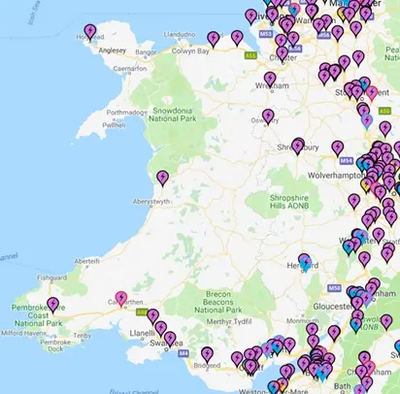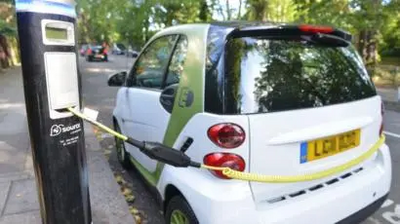The ‘electric desert’ of Wales - action needed on rapid recharge facilities Urgent action needed on EV recharging in Wales


https://www.facebook.com/greenlibdems/posts/3944723322212195The last couple of weeks have seen major announcements from UK Government on transport futures, that will have a huge impact on life in all parts of the UK. Nowhere will the effects be greater than here in Wales, writes Cllr William Powell.
Firstly, we had the announcement in early February that the sale of all petrol, diesel and hybrid cars in the UK are to be banned by 2035. In some quarters, an even earlier date has been mooted. Then last week came confirmation of colossal Westminster Government investment in taking forward HS2, despite the project's runaway budget.
Both announcements have provoked widespread debate and both may have merit to the East of Offa's Dyke - but the benefits anticipated in rail infrastructure between English, urban centres are matched by the additional challenges that Wales will face, as these decisions are implemented. Welsh Transport Minister, Ken Skates AM, has emphasised the adverse HS2 impact on Wales and has called for a £5 billion share of the funding, as a 'Barnett consequential'
https://www.bbc.co.uk/news/uk-wales-politics-51474181
This view is shared by Welsh transport expert, Prof Mark Barry of Cardiff University.
However, the earlier announcement of the UK Government's planned exit from the internal combustion engine in the 2030s throws down the gauntlet to Welsh Government and local authorities. Both will urgently have to 'step up to the plate' in matters of infrastructure which already fall within their remit, namely the dire lack of electric vehicle (EV) charge points.
Whilst England and Scotland will soon have the prospect of a cleaner air environment, without an ambitious programme of installing EV charge point infrastructure, all the old diesel and petrol cars threaten to see out their days in Wales, well into the 2040s! The need to develop a Welsh EV infrastructure fit for our future is therefore urgent.

The 'electric desert' of Wales
Those intrepid pioneers in Wales who have been driving electric vehicles for the past few years already know the anxiety of setting out on the north - south journey along the iconic A470 in an electric car. Mid-Wales in particular is in danger of becoming something of an 'electric desert' when it comes to EV charging. Knowing that there aren't any rapid EV charge points along the route, travellers have no choice but to take a risk. Failing that, they have to interrupt their trip for a few hours, while charging up on a slower recharge point.
Given the scarcity of recharge facilities, it is deeply dispiriting to locate an EV charge point only to discover that it's out of order. Such a discovery drives home the inconvenient truth: transition to electric vehicles will simply not be viable, without the roll out of a planned and resilient network of charging points.
Personal circumstances and differential levels of disposable income mean that making the switch to electric vehicles will be much more a process than an event. Nevertheless, the UK government's decision to bring forward the phasing out of diesel, petrol and hybrid cars to 2035 - or even sooner - means that electric cars will become the norm over the coming 10 years.
Community initiatives
TrydaNi, a Welsh based community benefit society, has recently been launched to make possible a community-based solution to this infrastructure challenge - helping Wales in the decarbonisation stakes, as well as fostering sustainable communities and bridging social divides such as lack of transport options and increasing social isolation.
The backers of TrydaNi - such as Talgarth and District Energy in my hometown in the Black Mountains - aim to become a 'one stop shop' for electric car charging in Wales, where a community-owned network, servicing communities the length and breadth of Wales, promotes the reinvestment of all profits. Initial priorities will include improving the charging network and working towards a bilingual service, to meet the work & leisure needs of locals, as well as supporting the growth of Green tourism.
Another priority for our EV pioneers is creating community recharge facilities for households without off road parking and for those who live in reinstated 'above the shop' flats in the town centre. This is particularly important if electric vehicles are to become accessible for all, rather than the preserve of the 'usual suspects.' In Talgarth, feasibility work is already underway to create such an innovative set of EV recharge facilities in the schoolyard of an abandoned Victorian school.

Wide spread support
Green Lib Dems should be in the vanguard of such schemes, particularly in deep rural areas of Mid Wales, and in communities without off-road parking, such as old mining communities, and small market towns with medieval street patterns.
EV recharge points will bring benefits to these communities now, and particularly as the EV car market gradually grows. As more and more EV drivers call in to re-charge and, of course, also use other facilities, such as hospitality businesses and shops, the latter will enjoy greater footfall.
Longstanding health benefits
Air pollution in many Welsh towns and cities is detrimental to all, discouraging cycling and walking, which in turn compounds the issue and just makes traffic congestion worse. Electrified public transport - bus fleets and rail rolling stock - are needed to address this.
There is no need to own an electric car to support the aims of TrydaNi but if you believe that EV infrastructure should benefit local communities in Wales now and for the future and can be delivered by a community benefit society, rather than by large multi-nationals, you have a reason to sign up.

William Powell


Please join our Facebook Discussion of this article
From GLD Challenge Magazine 2019-20
